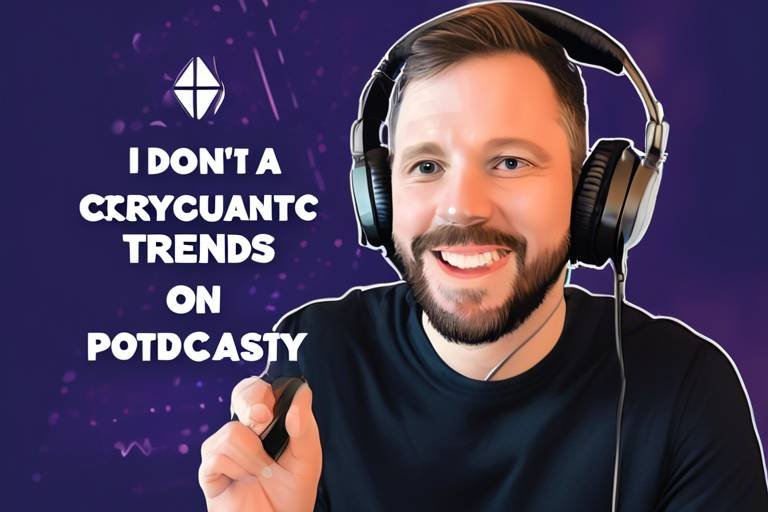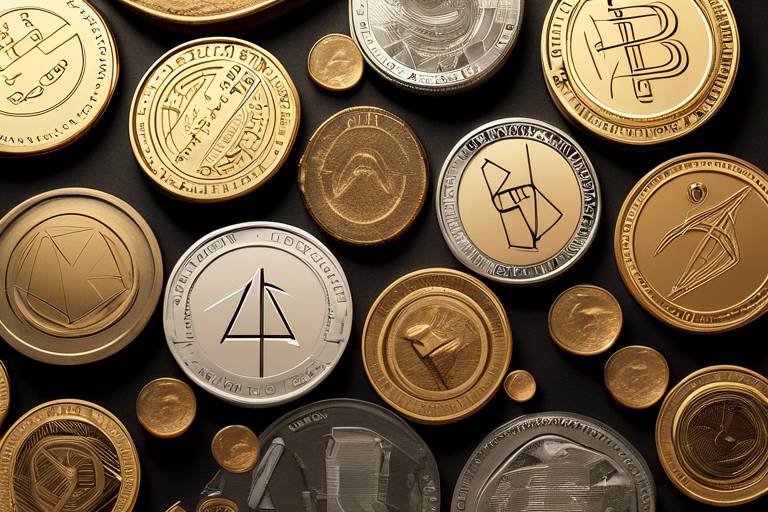How to Start a Podcast Focused on Cryptocurrency Trends
Starting a podcast can feel like jumping into a vast ocean of opportunities, especially in a rapidly evolving space like cryptocurrency. With the crypto market constantly changing, there’s no shortage of topics to explore. But how do you carve out your niche in this bustling arena? This article provides a comprehensive guide on launching a podcast centered around cryptocurrency trends, covering essential steps, tools, and strategies to engage your audience effectively. So, buckle up and get ready to dive deep into the world of podcasting!
Identifying your specific niche within the cryptocurrency space is crucial. Are you interested in discussing the latest altcoins, blockchain technology, or perhaps the social implications of cryptocurrencies? Pinpointing your focus not only helps you attract a dedicated audience but also sets you apart from the countless other podcasts available. Think about who you want to reach: Are they seasoned investors, curious beginners, or tech enthusiasts? By defining your target audience, you can tailor your content to meet their needs and interests, ensuring that your podcast resonates with them. Remember, in a world overflowing with information, clarity is your best friend!
Selecting the appropriate recording equipment can significantly impact your podcast's quality. The right tools can make your voice sound crisp and engaging, while poor equipment can lead to frustrating audio issues that drive listeners away. Here, we discuss essential tools and gear for recording and editing your cryptocurrency podcast, ensuring you have everything you need to produce top-notch content.
Quality microphones and headphones are vital for clear audio. Imagine listening to a podcast where the host sounds like they’re speaking from the bottom of a well—frustrating, right? To avoid this, investing in a good microphone is essential. Here are some options:
- USB Microphones: Great for beginners due to their ease of use.
- XLR Microphones: Ideal for those looking for professional sound quality.
Headphones are equally important, as they allow you to monitor audio quality while recording. Look for options that provide good sound isolation to keep distractions at bay.
For beginners, budget-friendly options can still deliver excellent sound quality. You don’t need to break the bank to start podcasting. Here are some affordable microphones and headphones that suit novice podcasters without sacrificing audio clarity:
| Equipment | Price Range | Notes |
|---|---|---|
| Blue Snowball Microphone | $50 - $70 | USB mic, easy to use, great sound quality. |
| Audio-Technica ATH-M50x Headphones | $150 | Excellent sound isolation and comfort. |
If you're looking to invest in higher-end gear, consider upgrading to professional equipment that enhances your podcast's overall production quality. While it may require a bit more investment, the payoff in sound quality and listener experience can be significant. Brands like Shure and Rode offer fantastic microphones that can elevate your audio game.
Choosing the right software for recording and editing is essential for a smooth workflow. You want tools that are user-friendly yet powerful enough to handle your editing needs. Popular recording software suitable for cryptocurrency podcasts includes:
- Audacity: Free, open-source, and packed with features.
- Adobe Audition: A professional-grade option with extensive editing capabilities.
- GarageBand: Ideal for Mac users, offering a simple interface with robust features.
Effective content planning is key to keeping your audience engaged. Just like a well-structured book, your podcast should have a clear flow. This section outlines strategies for structuring episodes and developing compelling topics related to cryptocurrency trends. Think of your podcast as a journey—each episode should take your listeners somewhere new, keeping them eager for the next stop!
Exploring different episode formats can help maintain listener interest. For instance, you might consider:
- Interview-Based: Invite experts to share their insights.
- Solo Episodes: Share your thoughts and analyses on current trends.
- Panel Discussions: Bring together a group of voices for diverse perspectives.
A content calendar helps in organizing your podcast episodes. Planning ahead allows you to schedule topics, ensuring consistent and relevant content delivery. Think of it as your roadmap—without it, you might find yourself lost or scrambling for ideas at the last minute.
Promoting your podcast is essential for attracting listeners. In the crowded podcast landscape, effective marketing strategies tailored to cryptocurrency enthusiasts can make all the difference. So, how do you get your voice heard above the noise?
Social media platforms can amplify your podcast's reach. Engaging with platforms like Twitter and LinkedIn can help you connect with your audience and share your episodes. Consider creating teaser clips or engaging posts that spark discussions about your latest topics—this can drive traffic and build a community around your podcast.
Building relationships within the crypto community can boost your podcast's visibility. Attend events, join online forums, and connect with influencers. By participating in discussions and collaborating with others, you’ll not only promote your content but also enrich your podcast with diverse viewpoints.
1. How long should my podcast episodes be?
Most podcasts range from 20 to 60 minutes. However, focus on delivering quality content rather than adhering to a strict timeframe.
2. Do I need a co-host?
It's not necessary, but having a co-host can bring diversity to your discussions and lighten the workload.
3. How often should I release new episodes?
Consistency is key! Whether it’s weekly, bi-weekly, or monthly, stick to a schedule that works for you.
4. What topics should I cover?
Stay current! Cover trending topics in the cryptocurrency world, interviews with experts, or deep dives into specific technologies.

Understanding Your Niche
Identifying your specific niche within the cryptocurrency space is crucial for the success of your podcast. With the rapid evolution of cryptocurrency trends, the market is saturated with various voices, all vying for attention. So, how do you stand out in this crowded arena? The first step is to define your target audience. Are you aiming to attract seasoned investors, crypto newbies, or perhaps tech enthusiasts who are curious about blockchain technology? Understanding who you want to reach will help you tailor your content, tone, and marketing strategies effectively.
Once you've pinpointed your target audience, it's time to consider what makes your podcast unique. What specific angle or perspective can you offer that isn't already available? This could be anything from focusing on emerging cryptocurrencies, discussing regulatory impacts, or even exploring the cultural implications of crypto adoption. The more specific you can be, the easier it will be to attract a loyal listener base. For example, if you choose to focus on decentralized finance (DeFi), your content can delve into the latest DeFi projects, interviews with developers, and tutorials on how to use various platforms.
Moreover, it's essential to analyze your competitors. Take a look at other cryptocurrency podcasts and note what they do well and where they fall short. This will not only help you identify gaps in the market but also inspire you to innovate and improve upon existing content. Consider creating a comparison table that highlights the strengths and weaknesses of popular podcasts in your niche:
| Podcast Name | Focus Area | Strengths | Weaknesses |
|---|---|---|---|
| Crypto 101 | Beginners | Accessible content | Limited advanced topics |
| The DeFi Podcast | Decentralized Finance | In-depth analysis | Heavy technical jargon |
| Bitcoin Uncensored | Bitcoin News | Strong community engagement | Occasional bias |
By understanding your niche and what your competitors are doing, you can carve out a space for yourself that not only attracts listeners but also keeps them coming back for more. Remember, the goal is to create a podcast that resonates with your audience, provides value, and ultimately builds a community around shared interests in cryptocurrency.
In summary, understanding your niche involves a combination of knowing your audience, defining your unique angle, and analyzing the competition. This foundational knowledge will guide your content creation and marketing strategies, setting you up for success in the ever-evolving world of cryptocurrency podcasts.
- What is a niche in podcasting? A niche is a specific area of focus that defines the content and audience of your podcast.
- How do I find my podcast niche? Research your interests, analyze existing podcasts, and identify gaps in the market to find your unique niche.
- Why is niche important in podcasting? A well-defined niche helps attract a targeted audience, making it easier to engage listeners and build a loyal following.

Choosing the Right Equipment
When it comes to launching your cryptocurrency podcast, is absolutely essential. The quality of your audio can make or break your podcast, and let's face it, nobody wants to listen to a show that sounds like it was recorded in a tin can. Investing in the right tools not only enhances the listening experience but also boosts your credibility as a podcaster. So, what do you need to get started?
First off, let’s talk about microphones. A good microphone is the heart of your podcasting setup. It captures your voice clearly and helps you sound professional. There are various types of microphones available, ranging from dynamic to condenser mics, each serving different purposes. For instance, dynamic microphones are fantastic for reducing background noise, making them a popular choice for podcasters recording in less-than-ideal environments. On the other hand, condenser microphones are known for their sensitivity and are perfect for capturing the nuances of your voice in a controlled setting.
Along with a solid microphone, you’ll need a good pair of headphones. This is where you can’t skimp out. Headphones allow you to monitor your audio quality in real-time, ensuring that you catch any issues before they become a problem. You want something that’s comfortable for long sessions and provides accurate sound reproduction. A closed-back headphone design is ideal, as it minimizes sound leakage and helps you focus on your recording.
If you're just starting out, you might be worried about the costs involved. But fear not! There are plenty of budget-friendly options that deliver excellent sound quality without breaking the bank. For example, the Audio-Technica ATR2100x-USB is a versatile microphone that offers both USB and XLR connectivity, making it perfect for beginners. Pair it with a decent set of closed-back headphones like the Sony MDR-7506, and you’re all set to start recording high-quality audio.
If you’re serious about podcasting and ready to invest in higher-end gear, consider upgrading to a condenser microphone like the Rode NT1 or Shure SM7B. These microphones are revered in the podcasting community for their exceptional sound quality and durability. For headphones, the Beyerdynamic DT 770 Pro is a fantastic choice, offering unparalleled comfort and sound isolation, which is crucial during long recording sessions.
Now that you have your microphone and headphones sorted, it’s time to think about the software you’ll use to record and edit your podcast. The right recording software can streamline your workflow and enhance your audio quality. Popular options include Audacity, which is free and user-friendly, and Adobe Audition, a more advanced tool that offers a plethora of features for those willing to invest. Each of these programs has its own learning curve, but once you get the hang of it, you’ll be able to create polished episodes that your audience will love.
In conclusion, choosing the right equipment is a pivotal step in your podcasting journey. With the right microphone, headphones, and recording software, you can ensure that your cryptocurrency trends podcast stands out in a crowded market. Remember, your audience deserves to hear you clearly, so invest wisely!
1. What is the best microphone for beginners?
The Audio-Technica ATR2100x-USB is highly recommended for beginners due to its affordability and versatility.
2. Do I need expensive headphones for podcasting?
While you don’t need the most expensive headphones, investing in a good pair that offers sound isolation and comfort is essential for monitoring audio quality effectively.
3. Can I use my smartphone to record a podcast?
Yes, many smartphones have decent recording capabilities. However, for better audio quality, it's advisable to use a dedicated microphone.
4. What software should I use for editing my podcast?
Audacity is a great free option, while Adobe Audition offers advanced features for those looking to invest in professional-grade software.

Microphones and Headphones
When it comes to podcasting, particularly in a niche as dynamic as cryptocurrency, the quality of your audio can make or break your show. Imagine tuning into a podcast where the host sounds like they're speaking from the bottom of a well—frustrating, right? That's why investing in the right microphones and headphones is crucial for creating an engaging listening experience. A good microphone captures your voice clearly, while quality headphones ensure you hear every nuance of your recording, allowing you to edit effectively.
There are various types of microphones available, each serving unique purposes. For instance, dynamic microphones are fantastic for environments with background noise, making them a popular choice among podcasters. On the other hand, condenser microphones are perfect for capturing detailed vocals, which is essential when discussing intricate topics like cryptocurrency trends. Consider your recording environment and choose accordingly.
Now, let’s talk about headphones. You might think any pair will do, but that's a common misconception. Using closed-back headphones is advisable as they help isolate sound, allowing you to focus on your audio without outside distractions. This is especially important when you’re editing your episodes. The clearer your sound, the more professional your podcast will feel.
| Microphone Type | Best For | Price Range |
|---|---|---|
| Dynamic Microphone | High background noise environments | $100 - $300 |
| Condenser Microphone | Detailed vocal capture | $100 - $500 |
For beginners, it's understandable to be concerned about the budget. Fortunately, there are affordable options that deliver excellent sound quality without breaking the bank. Brands like Audio-Technica and Blue Microphones offer entry-level models that are highly regarded in the podcasting community. Remember, you don't need the fanciest gear to start; what matters is how you use what you have!
For those ready to dive deeper into the world of podcasting and willing to invest a bit more, there are professional-grade options available. Shure SM7B and Rode NT1 are two highly recommended microphones that can elevate your podcast's audio quality significantly. Pairing these with high-quality headphones, like the Sony MDR-7506 or Beyerdynamic DT 770 Pro, can provide you with an exceptional audio experience that makes your podcast stand out.
In conclusion, selecting the right microphones and headphones is a vital step in your podcasting journey. Whether you're just starting out or looking to enhance your existing setup, investing in quality audio equipment will pay off in the long run. Your listeners will appreciate the effort, and you'll find that a crisp, clear sound can help convey your passion for cryptocurrency trends more effectively.
1. What type of microphone is best for podcasting?
Dynamic microphones are generally preferred for their durability and ability to handle background noise, while condenser microphones are great for capturing detailed vocals.
2. Do I really need expensive headphones?
While you don't need the most expensive headphones, investing in a good pair of closed-back headphones can significantly improve your editing experience.
3. Can I start podcasting with a smartphone?
Yes, many podcasters start with their smartphones. However, investing in a good microphone can greatly enhance your audio quality.

Budget-Friendly Choices
Getting started with podcasting doesn’t have to drain your wallet. In fact, there are numerous budget-friendly options that can deliver impressive audio quality without breaking the bank. For novice podcasters, the right equipment can make all the difference in the world. You want your listeners to enjoy your content without being distracted by poor sound quality. So, what are some great options that won’t leave you penniless?
First and foremost, let’s talk about microphones. A good microphone is essential for capturing clear audio, and you don’t need to spend a fortune to get one. Consider the Audio-Technica ATR2100x-USB. This versatile microphone offers both USB and XLR outputs, making it perfect for beginners who might want to upgrade their setup later. Another excellent choice is the Samson Q2U, which also provides both USB and XLR connectivity. Both of these options typically retail for under $100, making them accessible for anyone looking to start their podcasting journey.
Now, let’s not forget about headphones. Quality headphones are crucial for monitoring your audio while recording. You can find great options like the Audio-Technica ATH-M20x or the Samson SR850, both of which are known for their comfort and sound accuracy, and they usually cost under $50. These headphones will help you catch any issues in your audio before your episode goes live.
When it comes to recording software, there are several free and user-friendly options available. Programs like Audacity and GarageBand provide all the necessary tools for recording and editing your podcast without any financial investment. They may not have all the bells and whistles of paid software, but they are more than sufficient for newcomers.
To summarize, here’s a quick overview of some budget-friendly choices:
| Equipment | Recommended Model | Approximate Price |
|---|---|---|
| Microphone | Audio-Technica ATR2100x-USB | $79 |
| Microphone | Samson Q2U | $69 |
| Headphones | Audio-Technica ATH-M20x | $49 |
| Headphones | Samson SR850 | $39 |
| Recording Software | Audacity | Free |
| Recording Software | GarageBand | Free (Mac only) |
By investing in these budget-friendly choices, you can kickstart your podcasting adventure without worrying about finances. Remember, the key is to focus on delivering quality content that resonates with your audience, and the right equipment will only enhance that experience.
- What is the best microphone for beginners? The Audio-Technica ATR2100x-USB is highly recommended for its versatility and quality.
- Can I use free software for editing my podcast? Yes, Audacity and GarageBand are excellent free options for editing.
- Do I need expensive headphones? No, affordable headphones like the Audio-Technica ATH-M20x provide great sound quality for monitoring.

Professional Equipment Recommendations
When you're ready to take your cryptocurrency podcast to the next level, investing in professional equipment can make a significant difference in audio quality and overall production value. Think of your podcast as a finely tuned instrument; the better the equipment, the more harmonious the sound. Here are some top-notch recommendations for microphones, headphones, and other essential gear that will elevate your podcasting game.
Starting with microphones, one of the most important pieces of equipment for any podcaster, consider the Shure SM7B. This dynamic microphone is renowned for its rich sound quality and versatility, making it a favorite among professionals in the industry. It excels in various recording environments, effectively minimizing background noise and capturing your voice with clarity. If you're looking for something a bit more budget-friendly, the Audio-Technica ATR2100x-USB is a fantastic option that offers both USB and XLR outputs, allowing for flexibility as your podcast grows.
Next up are headphones. Quality headphones are essential for monitoring your audio while recording and editing. The Sony MDR-7506 headphones are a staple in the industry, known for their comfort and excellent sound reproduction. They allow you to hear every nuance of your recording, ensuring that your final product sounds polished and professional. Alternatively, the Audio-Technica ATH-M50x is another excellent choice that provides a balanced sound profile, making it suitable for various audio tasks.
Now, let’s talk about audio interfaces. These devices are crucial for connecting your microphone to your computer and enhancing sound quality. The Focusrite Scarlett 2i2 is a highly recommended option, offering two inputs, high-quality preamps, and low latency. It’s perfect for podcasters who may want to record multiple guests at once. Another great choice is the PreSonus AudioBox USB 96, which is both affordable and user-friendly, making it ideal for beginners.
Finally, don’t overlook the importance of pop filters and microphone stands. A pop filter helps eliminate plosive sounds, ensuring your audio remains clear and professional. The Stedman Proscreen XL is a top choice for its durability and effectiveness. Additionally, a sturdy microphone stand, like the Heil Sound PL-2T, will provide stability during your recordings, allowing you to focus on delivering great content without worrying about your equipment.
To summarize, investing in quality equipment is vital for creating a professional-sounding cryptocurrency podcast. Here’s a quick reference table to recap the recommendations:
| Equipment | Recommended Model | Notes |
|---|---|---|
| Microphone | Shure SM7B | Dynamic, excellent sound quality |
| Microphone | Audio-Technica ATR2100x-USB | Budget-friendly, versatile connections |
| Headphones | Sony MDR-7506 | Comfortable, great sound reproduction |
| Headphones | Audio-Technica ATH-M50x | Balanced sound profile |
| Audio Interface | Focusrite Scarlett 2i2 | Two inputs, high-quality preamps |
| Audio Interface | PreSonus AudioBox USB 96 | Affordable, user-friendly |
| Pop Filter | Stedman Proscreen XL | Durable, effective |
| Microphone Stand | Heil Sound PL-2T | Stable, adjustable |
With the right equipment in hand, you’ll be well on your way to producing high-quality episodes that resonate with your audience and stand out in the competitive world of cryptocurrency podcasts. Remember, investing in good gear is not just an expense; it's an investment in your podcasting future!
Q: Do I need expensive equipment to start a podcast?
A: Not necessarily! While quality equipment can enhance your podcast, many budget-friendly options can still deliver great sound. Start with what you can afford and upgrade as your podcast grows.
Q: How important is audio quality?
A: Audio quality is crucial for retaining listeners. Poor sound can be distracting and may lead to listeners tuning out. Investing in good equipment can significantly improve your podcast's appeal.
Q: Can I use my smartphone to record a podcast?
A: Yes, many smartphones have decent recording capabilities. However, for the best results, consider using an external microphone and audio interface.
Q: How often should I release new episodes?
A: Consistency is key. Whether it's weekly, bi-weekly, or monthly, choose a schedule you can maintain to keep your audience engaged.

Recording Software
Choosing the right software for recording and editing your podcast is a crucial step in ensuring that your content is not only high-quality but also engaging. With the myriad of options available, it can feel overwhelming to select the best one for your cryptocurrency podcast. However, understanding your specific needs and the features of various software can simplify this process significantly.
When looking for recording software, consider factors such as ease of use, audio quality, and editing capabilities. Some software is designed for beginners, providing intuitive interfaces and basic editing tools, while others offer advanced features for seasoned podcasters. Here are a few popular choices that cater to different levels of expertise:
- Audacity: This free, open-source software is a favorite among many podcasters. It offers robust editing capabilities and is compatible with both Windows and Mac. Plus, it has a supportive community that provides tutorials and plugins to enhance functionality.
- GarageBand: If you're a Mac user, GarageBand is a fantastic option. It’s user-friendly and comes pre-installed on most Apple devices. With its multi-track recording feature, you can easily layer audio tracks, making it ideal for interviews.
- Adobe Audition: For those willing to invest in professional software, Adobe Audition is a powerful tool. It offers advanced features for noise reduction, sound effects, and multi-track editing, perfect for creating polished episodes.
- Reaper: This software is known for its flexibility and affordability. It provides a comprehensive suite of features that can be tailored to your specific podcasting needs, all while maintaining a relatively low price point.
Once you’ve selected your recording software, the next step is to familiarize yourself with its features. Spend some time exploring the interface, experimenting with different tools, and learning how to manipulate audio tracks. This investment in time will pay off when you’re ready to record your first episode. Remember, the smoother your workflow, the more time you can dedicate to creating engaging content for your listeners.
Additionally, don't overlook the importance of backup solutions. Regularly save your work and consider using cloud storage to avoid losing precious recordings. Many podcasters have experienced the nightmare of losing an entire episode due to software crashes or hardware failures, so a little precaution goes a long way.
In summary, selecting the right recording software is essential for producing a high-quality cryptocurrency podcast. By understanding your needs and exploring various options, you can find the perfect fit that allows you to focus on what truly matters: delivering engaging and insightful content to your audience.

Content Planning and Structure
Effective content planning is the backbone of a successful podcast, especially one focused on the ever-evolving world of cryptocurrency trends. You might be wondering, "How can I keep my audience engaged in such a fast-paced environment?" The answer lies in a well-structured approach that not only captures the essence of current trends but also resonates with your listeners on a personal level.
First off, think about your audience's interests. Cryptocurrency is a vast field, encompassing everything from blockchain technology to market analysis and investment strategies. By honing in on specific topics, you can create episodes that are not just informative but also entertaining. Consider conducting surveys or polls on social media to gauge what your audience is curious about. This way, you’re not just guessing; you’re engaging with your listeners directly.
Next, let's talk about episode formats. Variety is key to maintaining listener interest. You could explore different styles such as:
- Interview-based episodes: Bring in experts or influencers from the crypto space to share their insights.
- Solo episodes: Share your personal thoughts and analyses on the latest trends.
- Panel discussions: Invite multiple guests to discuss a topic, providing diverse perspectives.
Each format has its unique appeal, so don’t hesitate to mix them up. This not only keeps your content fresh but also allows you to experiment with what resonates best with your audience.
Another essential component of content planning is developing a content calendar. This tool is invaluable for organizing your episodes and ensuring that you’re consistently delivering relevant content. Imagine trying to navigate the chaotic waters of cryptocurrency without a map; that’s what it’s like without a content calendar! By scheduling your topics in advance, you can:
- Align your episodes with current events in the crypto world.
- Ensure a balanced mix of topics over time.
- Plan for special episodes that coincide with significant dates, like crypto conferences or major market movements.
Creating a content calendar can be as simple as using a spreadsheet or a dedicated project management tool. Just make sure to include key details like the episode title, format, guest names (if applicable), and recording dates. This will help you stay organized and focused.
Finally, don’t underestimate the power of listener feedback. After each episode, encourage your audience to share their thoughts and suggestions. This not only helps you improve but also fosters a sense of community around your podcast. Remember, your listeners are your greatest asset, so make them feel valued and heard.
In conclusion, content planning and structure are crucial for a successful cryptocurrency podcast. By understanding your audience, experimenting with episode formats, maintaining a content calendar, and actively seeking feedback, you can create a compelling podcast that stands out in the crowded crypto landscape.
Q1: How often should I release new podcast episodes?
A1: Consistency is key! Depending on your capacity, aim for a weekly or bi-weekly schedule to keep your audience engaged without overwhelming yourself.
Q2: What topics should I cover in my cryptocurrency podcast?
A2: Focus on current trends, expert interviews, market analysis, and educational content. Tailor your topics based on audience feedback and emerging trends.
Q3: How can I promote my podcast effectively?
A3: Utilize social media, engage with the crypto community, and consider collaborations with other podcasters or influencers to expand your reach.

Episode Formats
When it comes to podcasting, the format of your episodes can make or break your connection with your audience. Think of it like choosing the right outfit for an important event; it sets the tone and creates an impression. In the world of cryptocurrency, where trends shift rapidly and information is abundant, selecting the right episode format can help you stand out in a crowded space. Here are some popular formats that you might consider for your cryptocurrency podcast:
1. Interview-Based Episodes: This format involves inviting guests who are experts in the cryptocurrency field. Imagine sitting down with a seasoned trader or a blockchain developer and diving deep into their insights. This not only adds credibility to your content but also provides your listeners with varied perspectives. Plus, interviews can make your podcast feel more dynamic and engaging, almost like a casual conversation over coffee.
2. Solo Episodes: If you have a wealth of knowledge or a passionate opinion about a particular cryptocurrency trend, going solo can be a fantastic choice. This format allows you to express your thoughts freely and connect with your audience on a personal level. It's like sharing your thoughts with a friend, making it relatable and engaging. Just ensure you keep the energy up and provide valuable insights to keep listeners hooked!
3. Panel Discussions: Bringing together a group of experts for a lively discussion can create an engaging atmosphere. Picture a roundtable where different voices come together to debate the latest trends, news, or predictions in the cryptocurrency world. This format not only enriches the conversation but also provides multiple viewpoints, giving your audience a well-rounded understanding of the topic at hand. It’s like a virtual town hall meeting where everyone can weigh in on the hot topics!
In addition to these formats, you can also mix and match them to keep things fresh. For instance, you might start with a solo episode to introduce a topic, then follow up with an interview for deeper insights, and conclude with a panel discussion to wrap it all up. The key is to maintain a balance and ensure that each episode delivers value to your listeners.
Ultimately, the format you choose should resonate with your style and the preferences of your audience. Don't hesitate to experiment and gather feedback to see what works best. Just like in cryptocurrency trading, where you analyze trends to make informed decisions, use your audience's feedback to refine your podcast format and keep it engaging.
Q: How do I choose the right episode format for my podcast?
A: Consider your strengths, the interests of your target audience, and the type of content you want to deliver. Experiment with different formats and gather feedback to see what resonates best.
Q: Can I mix different episode formats in my podcast?
A: Absolutely! Mixing formats can keep your content fresh and engaging. Just ensure that the transitions between formats feel natural and cohesive.
Q: How long should each episode be?
A: While there's no hard and fast rule, aim for 20-60 minutes per episode. Focus on delivering value and keeping your audience engaged, regardless of the length.
Q: How can I keep my audience engaged throughout the episode?
A: Use storytelling techniques, ask rhetorical questions, and encourage audience interaction through social media or Q&A segments. Keeping a conversational tone can also help maintain interest.

Creating a Content Calendar
Creating a content calendar is like having a roadmap for your podcast journey. It ensures that you stay on track, delivering consistent and relevant episodes that keep your audience engaged. Think of it as a blueprint that outlines what you’ll talk about and when, helping you avoid the dreaded last-minute scramble for content. But how do you go about setting one up? Let's dive in!
First, you need to define your podcast's themes and topics. Given that your focus is on cryptocurrency trends, consider what aspects of the crypto world excite you the most. Are you passionate about market analysis, blockchain technology, or perhaps the latest altcoin developments? Identifying these themes will help you generate a list of potential episode topics. You can brainstorm and jot down ideas as they come to you; don't worry about filtering them just yet.
Once you have a pool of ideas, it’s time to organize them. A simple yet effective way to do this is by using a spreadsheet. You can create columns for the episode title, recording date, release date, and any special notes or guests you plan to include. Here’s an example of what your content calendar might look like:
| Episode Title | Recording Date | Release Date | Notes/Guests |
|---|---|---|---|
| Understanding Bitcoin Basics | 01/15/2024 | 01/22/2024 | Invite a Bitcoin expert |
| The Future of Ethereum | 01/29/2024 | 02/05/2024 | Discuss ETH 2.0 updates |
With your calendar structure in place, the next step is to decide on a frequency for your episodes. Are you aiming for weekly releases, bi-weekly, or perhaps monthly? Consistency is key, so choose a schedule that you can realistically maintain. Once you establish your frequency, fill in your calendar with episode titles and dates, ensuring a balanced mix of topics that cater to different interests within the cryptocurrency space.
Don't forget to leave some flexibility in your calendar. The crypto world is fast-paced, and trends can change overnight. It’s wise to have a few “buffer” episodes or topics that can be adjusted based on current events or emerging trends. This way, you can stay relevant and keep your content fresh.
Finally, review your content calendar regularly. This allows you to assess what’s working and what might need adjustments. Engage with your audience through social media or feedback forms to understand their preferences better. Are they more interested in technical analysis, or do they prefer interviews with industry leaders? Use this feedback to refine your content strategy over time.
In summary, a well-structured content calendar not only streamlines your podcast production process but also enhances your ability to connect with your listeners. By planning ahead, you can create compelling, timely content that resonates with your audience, ultimately leading to a successful cryptocurrency podcast.
- How often should I release new podcast episodes? It depends on your capacity, but consistency is crucial. Many podcasters find success with a weekly or bi-weekly schedule.
- What tools can I use to create a content calendar? You can use simple tools like Google Sheets, Excel, or dedicated project management tools like Trello or Asana.
- How do I choose topics for my podcast? Focus on your interests, current trends in cryptocurrency, and audience feedback to generate relevant topics.

Marketing Your Podcast
So, you've got your podcast all set up, and you're ready to dive into the exciting world of cryptocurrency trends. But wait! How do you get people to actually listen? Marketing your podcast is crucial, and it can be the difference between a few listeners and a thriving community. Think of your podcast as a hidden gem; without the right marketing strategies, it might just sit there, collecting digital dust. Let's explore some effective ways to promote your podcast and attract those eager ears!
First and foremost, social media is your best friend. Platforms like Twitter, Instagram, and LinkedIn are gold mines for reaching potential listeners who are passionate about cryptocurrency. You can create engaging posts that highlight snippets from your episodes, share intriguing quotes, or even run polls to involve your audience. Make sure to use relevant hashtags like #CryptoPodcast or #BlockchainTrends to expand your reach. The key is to be consistent and authentic in your interactions; people appreciate genuine engagement more than a sales pitch.
Next, consider building relationships within the cryptocurrency community. This is where the magic happens! Engage with influencers and other podcasters in your niche. Comment on their posts, share their content, and don’t hesitate to reach out for collaborations. When you establish connections, you not only gain visibility but also credibility. Think of it as a community of like-minded individuals supporting each other’s journeys. You might even find opportunities for guest appearances on other podcasts, which can introduce your show to a whole new audience.
Another effective strategy is to leverage email marketing. If you have a website or a landing page, encourage visitors to subscribe to your newsletter. This way, you can keep your audience updated on new episodes, share exclusive content, and even offer sneak peeks of upcoming shows. A well-crafted email can be a powerful tool, making your listeners feel like they are part of an exclusive club. Just remember to keep your emails engaging and informative—nobody likes spam!
Finally, don't underestimate the power of podcast directories. Make sure your podcast is listed on all the major platforms, including Apple Podcasts, Spotify, and Google Podcasts. Each platform has its own audience, and being present on multiple directories increases your chances of being discovered. Encourage your listeners to leave reviews and ratings; positive feedback can significantly enhance your podcast's visibility and credibility.
In summary, marketing your podcast is not a one-time effort but an ongoing strategy that requires creativity and persistence. By utilizing social media, engaging with the cryptocurrency community, leveraging email marketing, and ensuring your podcast is listed on key directories, you'll be well on your way to building a loyal listener base. Remember, the journey may take time, but with dedication and the right approach, your podcast can shine brightly in the vast universe of cryptocurrency trends.
- How long should I promote my podcast before launching? It's ideal to start marketing your podcast at least a few weeks before your launch. This builds anticipation and allows potential listeners to get excited about your content.
- What social media platforms are best for promoting a podcast? Twitter, Instagram, and LinkedIn are highly effective for reaching cryptocurrency enthusiasts. Choose platforms where your target audience is most active.
- How can I engage with my listeners? Encourage feedback through social media, respond to comments, and consider creating a dedicated space for listener interaction, such as a Discord server or a Facebook group.

Utilizing Social Media
In today’s digital age, social media is not just a platform for sharing memes and cat videos; it’s a powerful tool for podcasters, especially those diving into the vibrant world of cryptocurrency. Imagine social media as the megaphone that amplifies your voice, allowing you to reach potential listeners who are passionate about crypto trends. But how do you effectively harness this power? Let’s break it down.
First and foremost, choose the right platforms. While there are countless social media channels out there, not all of them will serve your podcast equally. For cryptocurrency enthusiasts, platforms like Twitter and LinkedIn are gold mines. Twitter is especially great for real-time discussions and updates, while LinkedIn can help you connect with industry professionals and thought leaders. Think of it this way: if Twitter is the bustling marketplace where ideas are exchanged rapidly, LinkedIn is the sophisticated conference where serious discussions happen.
Next, engagement is key. It’s not enough to simply post your podcast episodes and hope for the best. You need to interact with your audience. Respond to comments, ask questions, and create polls related to your podcast topics. This not only builds a community around your podcast but also encourages listeners to feel more connected to you and your content. For instance, after releasing an episode on the latest cryptocurrency trends, you might ask your followers what topics they want to hear next or their thoughts on a specific trend discussed in the episode. This two-way communication fosters loyalty and keeps your audience coming back for more.
Another effective strategy is to create shareable content. Think about it: what kind of content would make your listeners want to share your podcast? Infographics, short video clips, or even engaging quotes from your episodes can work wonders. For example, if you have a guest expert discussing the future of Bitcoin, pull out a compelling quote and design a visually appealing graphic. This can be shared across platforms, drawing in new listeners who might not have discovered your podcast otherwise. Remember, shareable content acts like a magnet, pulling in potential fans from various corners of the internet.
Finally, consider collaborations. Partnering with other podcasters or influencers in the cryptocurrency space can significantly expand your reach. When you collaborate, you tap into each other’s audiences, which can lead to a surge in new listeners. Think of it as a friendly handshake that opens doors to new opportunities. You could host joint episodes, guest appearances, or even social media takeovers. The key is to find partners whose audiences align with yours, ensuring that the collaboration feels natural and beneficial for both parties.
In conclusion, utilizing social media effectively can transform your podcast from a hidden gem into a recognized name in the cryptocurrency community. By choosing the right platforms, engaging with your audience, creating shareable content, and collaborating with others, you’ll not only grow your listener base but also establish a strong presence in the crypto podcasting world.
- How often should I post on social media? Aim for consistency. Whether it's daily or a few times a week, find a rhythm that works for you and stick to it.
- What type of content should I share? Share a mix of promotional content, engaging questions, industry news, and behind-the-scenes looks at your podcasting process.
- Should I engage with other podcasters? Absolutely! Networking with others in your niche can lead to collaborations and cross-promotion opportunities.

Engaging with the Cryptocurrency Community
Engaging with the cryptocurrency community is not just a strategy; it's a vital part of building your podcast's credibility and reach. Imagine stepping into a vibrant marketplace buzzing with ideas, innovations, and discussions. That’s what the crypto community feels like! To truly connect with your audience, you need to immerse yourself in this dynamic environment. Start by participating in forums, attending virtual meetups, and joining social media groups dedicated to cryptocurrency. This involvement will not only help you understand the latest trends but also position you as a trusted voice in the space.
One effective way to engage with the community is through social media platforms. Twitter, for example, is a hotspot for real-time discussions about cryptocurrency. You can follow influential figures in the crypto world, share your podcast episodes, and even participate in trending conversations. By using relevant hashtags like #CryptoPodcast or #BlockchainTalk, you can increase your visibility and attract listeners who are genuinely interested in your content.
Moreover, consider hosting live Q&A sessions on platforms like Instagram or Twitter Spaces. This not only allows you to interact directly with your audience but also gives them a chance to voice their opinions and ask questions about cryptocurrency trends. Think of it as hosting a virtual town hall meeting where everyone gets to share their thoughts and ideas. Engaging in this manner fosters a sense of community and loyalty among your listeners.
Another powerful strategy is to collaborate with other podcasters or influencers in the cryptocurrency space. By inviting guests who have a substantial following, you can tap into their audience and introduce your podcast to potential new listeners. This collaboration could be in the form of interviews, cross-promotions, or even joint episodes. Remember, the more you connect with others in the crypto community, the more you expand your network and enhance your podcast’s reach.
Lastly, don't underestimate the power of feedback. Encourage your listeners to share their thoughts on your episodes, suggest topics, or even critique your content. This not only helps you improve but also makes your audience feel valued and heard. You might even discover new ideas for episodes that resonate with the community's interests. Engaging with your audience in this way transforms your podcast from a one-way broadcast into a two-way conversation, creating a loyal listener base that feels personally connected to your journey.
- How can I start engaging with the cryptocurrency community?
Begin by participating in online forums, social media groups, and attending virtual meetups. Engaging in discussions and sharing your insights can help you connect with others. - What social media platforms are best for promoting a cryptocurrency podcast?
Twitter and LinkedIn are excellent platforms for reaching cryptocurrency enthusiasts. Use relevant hashtags and engage with influencers to increase your visibility. - How can collaborations enhance my podcast's reach?
Collaborating with other podcasters or influencers can introduce your content to new audiences and provide fresh perspectives, boosting your podcast's credibility. - Why is listener feedback important?
Listener feedback helps you understand your audience's preferences and interests, allowing you to tailor your content and improve engagement.
Frequently Asked Questions
- What is the first step to starting a cryptocurrency podcast?
The first step is to identify your niche within the cryptocurrency space. Think about what specific topics excite you and what gaps exist in the current podcast landscape. This will help you define your target audience and set your podcast apart from others.
- Do I need expensive equipment to start podcasting?
No, you don't need to break the bank! There are plenty of budget-friendly options available that offer excellent sound quality. Start with a decent microphone and headphones, and as you grow, you can invest in more professional-grade equipment.
- What software should I use for recording my podcast?
Choosing the right recording software is crucial. Popular options like Audacity and Adobe Audition provide user-friendly interfaces and powerful editing tools that can help you produce high-quality audio for your cryptocurrency podcast.
- How can I keep my podcast content engaging?
Planning is key! Create a content calendar to schedule your episodes and ensure you're covering a variety of interesting topics. Also, consider mixing up your episode formats, such as interviews, solo discussions, or panel talks, to keep things fresh for your listeners.
- What are effective ways to market my podcast?
Social media is a powerful tool for promotion. Utilize platforms like Twitter and LinkedIn to connect with your audience. Engaging with the cryptocurrency community, attending events, and collaborating with influencers can also significantly boost your podcast's visibility.
- How often should I release new episodes?
Consistency is important! Whether you choose to release episodes weekly, bi-weekly, or monthly, stick to a schedule that works for you and your audience. This helps build anticipation and keeps your listeners coming back for more!


















